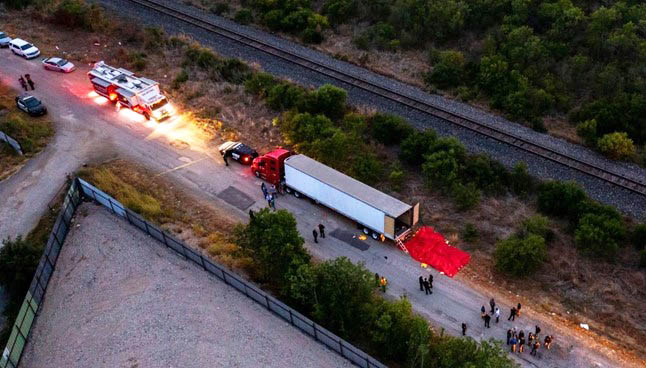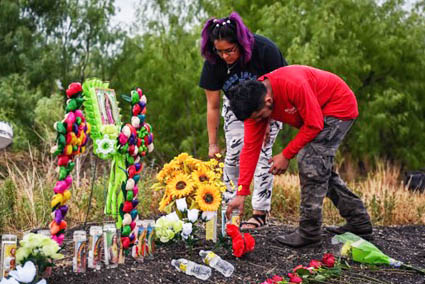|
|
|
|
The weekly newsletter of the México Solidarity Project |
|
|
|
Online at mexicosolidarityproject.org |
|
July 6, 2022/ This week's issue/ Meizhu Lui, for the editorial team |
|
|
Jordan Vonderhaar/Getty Images |
|
Human Cargo: The Real Criminals Roll On |
|
Last week brought the biggest single-incident toll yet — in human lives — from our failed U.S. immigration policies. Some 53 people died of heat exhaustion and suffocation trapped in the back of an 18-wheeler carrying a cargo of migrants through Texas, most of them from México.
But this horror hardly rates as a “single incident.” Nine years ago, also in Texas, 19 people died trapped in another 18-wheeler. In 2017, 10 more migrants perished in the back of a truck in a San Antonio Walmart parking lot. These cases all represent just a sampling of the tragedies from Texas, a territory seized from México by force in 1848. Our politicians consider all these migrants “illegal border crossers.” In fact, the border crossed them.
Those profiteers who engage today in the business of transporting migrants see their human cargo through the same lens as the slave traders did. They see migrants as profitable commodities, not as fathers and mothers, sons and daughters.
Politicians like Texas governor Greg Abbott did — for half a second — give “thoughts and prayers” about last week’s tragedy. But then they immediately jumped back into the political blame game that treats migrants as no more than criminals. Abbott’s policy response to our latest 53 dead? He’s putting more truck checkpoints on his highways, a reaction sure to lead only to more arrests and deportations.
Each time migrant tragedy strikes, we feel horrified, just as we do with school shootings. But then, as veteran border activist Josefina Castillo notes in our interview this week, our attention shifts quickly to the next big thing. That leaves still more trucks rumbling down our highways, packed with human cargo, until the inevitable next disaster strikes. We need to stop trucking in tragedy. We need to reject “them” vs. “us.” We’re all “us.” |
|
|
|
Don’t miss an issue. Subscribe to the weekly México Solidarity Bulletin! |
|
|
|
|
‘They Didn’t Find the American Dream, They Found Death’ |
|
Few people have worked longer and harder for justice in the borderlands than Josefina Castillo, the co-founder of Austin Tan Cerca de la Frontera, the Texas advocacy group that’s been building community-based transnational solidarity for over two decades. Castillo, also a Women on the Border board member, studied at the Universidad Nacional Autonóma de México and then earned a PhD in education from the University of Arizona. She went on to work as a popular educator in both México and the United State and then directed Austin’s American Friends Service Committee office. |
|
|
How did you decide to found Austin Tan Cerca de la Frontera?
I didn’t really intend to live in the US at all, but some 20 years ago the Austin office of the American Friends Service Committee had an opening that fit what I wanted to do. I got the job, and I’m still here!
Austin Tan Cerca de la Frontera started as a project of the AFSC. We wanted to make the connection between immigration and economic justice, and some northern México maquila organizers from the Comité Fronterizo de Obreras, based in Piedras Negras, Coahuila, had come to do a presentation for us. That presentation moved some folks in the audience to organize a delegation to México to repay them for their visit.
What started as an informal “payback” visit soon became a unique solidarity relationship that has now lasted over 22 years. We’ve gone to México several times a year, stayed at the homes of maquiladora workers, and formed friendships. We’ve experienced first-hand the living and working conditions those workers face. We decided to keep this program going after the Austin AFSC office closed a dozen years ago.
On June 28, we learned that 53 migrants had died in a trailer truck in San Antonio. What cost them their lives?
We’ve seen changes in migration patterns. In the past, a lack of jobs was driving migration. Inside México, people moved internally mainly to places that needed labor — to help with a harvest, for example. Some people did go to the US, but, back then, mainly men did the migrating and they migrated individually.
Now we’re seeing added reasons that push people to migrate, They’re escaping from violence, either by drug cartels or domestic abuse. Migrant deaths, meanwhile, have been increasing because tighter border controls have pushed migrants to cross in more dangerous areas such as the Arizona desert, where dehydration and the relentless sun are taking many migrant lives.
We’re also seeing mass migration, not just of men, but women and children. With crossing the border harder, people need to hire guides — and that’s helped international organized crime networks make immigration into a big business. Just think about how much money smugglers can make when they charge $10,000 to $15,000 per person, in a trailer filled with 100 to 300 people! This can come to millions of dollars from just one 18-wheeler.
A tragedy like the one in San Antonio, with 53 people asphyxiated, shocks us all. But trailers like this one are every day smuggling in hundreds of immigrants. Where do people get the passage money? They often have relatives in the US who send money to bring their families over through these dangerous means. |
|
How have people in the border communities you work with reacted to this latest horrific event?
Well, people who have gone through similar conditions feel “this could have happened to me!” Some of our partners from Fuerza Unida in San Antonio have had community meetings with a spiritual component, mourning the deaths of their brothers and sisters. |
|
|
The site where the death truck turned up/Kylie Cooper/The Texas Tribune |
|
People also feel the need to get more involved in politics, to vote and put pressure on their representatives on behalf of poor immigrant communities of color. They say that instead of finding the so-called “American dream,” their countrymen have found death.
Some politicians are saying we need greater border security to prevent this kind of tragedy.
Border security, even with high tech like electronic detectors, even with more militarization, hasn’t deterred migrants from crossing. The Republican governor of Texas, Greg Abbott, has publicly blamed President Biden for “opening the borders.” If we had open borders, no one would be hiding in an unventilated truck.
What do we need to do instead?
In the short-term, authorities in both countries have to build a strategy against corruption at the border and work on broad immigration reform. Current policy punishes the victims. But political polarization hinders these efforts. A long-term strategy requires looking at the root causes of migration in the countries of origin. If we don’t change the conditions that threaten what’s precious in human beings, people won’t stop migrating — and they’ll have to travel increasingly more difficult and dangerous routes.
To paraphrase what the Chicana author Gloria Anzaldúa wrote several decades ago. “The border is like a wound that bleeds constantly.” Today, as we grieve the 53 dead, the wound runs deeper than ever. The bleeding continues.
This coming September 3, on Labor Day afternoon, activists at Austin Tan Cerca de la Frontera will be hosting their front-line partners at the Comité Fronterizo de Obrer@s, who’ll be sharing their take, together with local immigrant rights leaders, on union organizing in México‘s maquiladoras. Spread the word with this leaflet and come practice transnational solidarity with worker and immigrant organizers! |
|
|
The Border of Death/La Frontera de Muerte |
|
First came the May 24 slaughter of 19 Chican@ elementary school students and two teachers in Uvalde, Texas, and then, on June 27 in San Antonio, the discovery of 53 Mexican and Central American migrant bodies in a tractor-trailer. |
|
The children and teachers were massacred with an automatic weapon similar to the tens of thousands of US guns that annually arrive in Mexico and slaughter innocents there. And the death of the 53 in San Antonio ties directly to Yanqui imperialism’s militarism of the US-Mexico border. More than 650 migrants died in 2021 trying to cross La Frontera de Muerte, more than in any other year since the UN International Organization for Migration began tracking the data in 2014. |
|
|
These numbers all reflect only recorded deaths. Hundreds more most likely have died alone, desperate, and anonymous, trying to escape the violence and poverty largely caused by the US economic domination and exploitation of their home countries.
AMLO, you rightly refused to attend the so-called “Summit of the Americas” last month in Los Angeles. You called out Biden for his anti-democratic decision to exclude several Latin American countries. In a few days, on July 12, you’ll be meeting one-on-one with Biden. You have an opportunity here to go beyond symbolism.
You can demand the cooperation needed to stop the flow of arms into México. You can demand an end to the racist Yanqui immigration policies that violate international law by refusing to accept and process refugee and asylum applications, a policy that forces pobres to risk death in the desert or in the tractor-trailers of greedy coyotes. The US must dismantle the Border of Death and work with México to replace it with a Border of Life.
And you can remind Biden that in the early 1900s millions of European immigrants could enter the US nearly without restriction, as are refugees from Ukraine today. Excluding non-white immigrants from Mexico and the Global South will always be anti-democratic. Aren’t we humans too, deserving of “human rights”?
Shut down La Frontera de Muerte and Open La Frontera de Vida! |
|
Bill Gallegos, a veteran Chicano |
|
|
|
Recent news reports and commentaries, from progressive and mainstream media,
San Antonio Organizer: U.S. Immigration Policy Is to Blame for Deaths of 53 in Smuggling Tragedy, Democracy Now! We can prevent every single migration-related tragedy with policy that actually focuses on welcome and care.
Gerardo Lissardy, En qué se diferencia la nueva ola de izquierda en América Latina de la “marea rosa” que surgió hace dos décadas, BBC News Mundo. Algo que tienen en común los candidatos de izquierda en la región — y parece ayudarlos a atraer esos votos cruciales de centro — es su mayor énfasis en la acción del Estado para disminuir la desigualdad económica.
Kendal Blust, ‘We know what happened’: AMLO promises full report on Ayotzinapa case by year end, Fronteras. An independent team of researchers has already disproved the official story presented by the previous administration.
Emir Olivares y Néstor Jiménez, Este año queda resuelto Ayotzinapa; ya sabemos qué pasó: López Obrador, La Jornada. Afirmó el mandatario que se avanza en las indagatorias, pero “no queremos apresurarnos, sino tener todos los elementos y las pruebas”.
Rodrigo Guillot, The era of Northern hegemony over México is coming to an end, Peoples Dispatch. The triumph of Morena in one of Latin America’s largest countries has opened a cycle of hope among progressive forces in the region. |
|
|
The Mexico Solidarity Project brings together activists from various socialist and left organizations and individuals committed to worker and global justice who see the 2018 election of Andrés Manuel López Obrador as president of México as a watershed moment. AMLO and his progressive Morena party aim to end generations of corruption, impoverishment, and subservience to US interests. Our Project supports not just Morena, but all Mexicans struggling for basic rights, and opposes US efforts to undermine organizing and México’s national sovereignty.
Editorial committee: Meizhu Lui, Bruce Hobson, Bill Gallegos, Sam Pizzigati, Courtney Childs, Victoria Hamlin, Agatha Hinman, Steven Hollis. To give feedback or get involved yourself, please email us! |
|
|
|
Web page and application support for the México Solidarity Project from NOVA Web Development, a democratically run, worker-owned and operated cooperative focused on developing free software tools for progressive organizations. |









